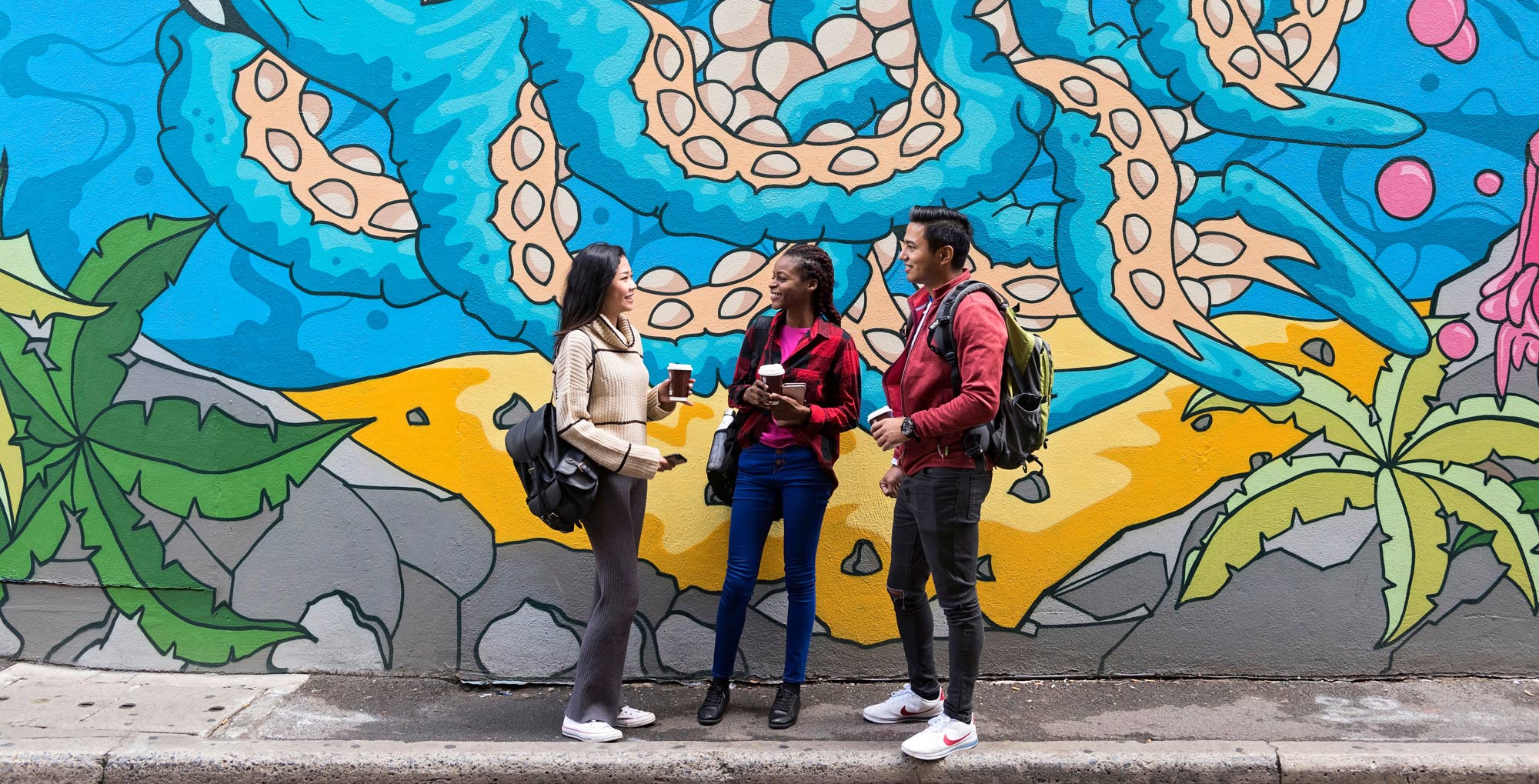

Some international students may experience the five stages of culture shock during their time abroad. At the University of Adelaide College, we want to make sure you know what it’s all about and how you can help yourself and find the right support to make the most of your overseas experience.
You’ve been planning your move abroad for a long time, and now you’ve finally arrived! It’s an exciting time, and you know that this experience is going to be life-changing. So, why do you find yourself feeling a bit depressed, irritable and low in energy?
Sound familiar? First of all, don’t worry, there’s nothing wrong with you. What you’re experiencing is completely normal. It’s something called culture shock, and it’s a perfectly natural response to the new situation you find yourself in.
Moving to a new country is one of the most rewarding but challenging experiences a person can go through. It will test your patience, confidence and resilience. It’s going to be an emotional rollercoaster, but it’s well worth the ride and a critical time for your self development.
What is culture shock?
Culture shock means more than that initial feeling of strangeness you get when you land in a different country for a short holiday. It’s actually a set of powerful emotional and physical effects that result from moving to another country, longer term.
Here are some common symptoms you may experience during the different stages of culture shock:
- Withdrawal (staying in your room, avoiding contact with others)
- Feelings of vulnerability, anxiety or helplessness
- Sleeping a lot or tiring easily
- Depression, loneliness and distrust of others
- Suffering from body pains and aches
- Longing to be back home
- Irritability and frustration with local ways of doing things
- Experiencing ‘information overload’
- Having a heightened concern for your health
- Overcompensating to try to ‘fit in’
- Being overwhelmed by even small challenges
- Shyness and insecurity
- Boredom
- Having second thoughts about why you moved
- Feeling lost
Everyone experiences culture shock differently, so you will likely only display some of these symptoms. Your symptoms will also change, as you progress through each of the ‘five stages.’
So, what are the five stages of culture shock?

Stage 1: The honeymoon stage
When you first arrive in your new home, everything is exciting and new. You’re filled with a sense of wonder and adventure. All the small differences seem incredibly romantic, and you may even idealise your local culture.
How to make the most of this stage: It’s really important to enjoy yourself as much as possible during this early stage. Go out and explore, make as many friends as you can, and have lots of fun.
- Use this energy to develop connections with people who can support you through the hard stages.
- By going out and having fun, you’ll create a positive worldview for yourself at the start of your journey. Memories of this time will make it easier for you to remind yourself that ‘everything’s fine’, during the harder times.

Stage 2: Rejection and hostility
After several months, the same cultural differences that initially seemed so quirky and cute might become a source of irritation. You may start negatively comparing local customs with how things are done at home. You begin thinking nostalgically about your country, and even feel culturally superior to locals.
By this stage, you’ve begun to have some negative experiences as a result of language or cultural differences.
Perhaps you’ve experienced what you consider to be rude behaviour, or you’ve had to confront some bureaucratic system that you consider to be irrational. Each confrontation becomes an emotional setback, and you begin to display some of the symptoms listed above.
How to survive stage 2: This is the most difficult stage, so hang in there. Things will get easier! Don’t forget, your friends and family are only a phone call away.
- Learn your new language as quickly as possible. Signing up for a language class is also a great way to learn about cultural differences.
- Keep an open mind and stop comparing. What you may consider rude or irrational behaviour is usually cultural, so don’t take it personally.
- Keep communicating and get to know locals as much as possible, even if you feel like withdrawing.
- Put your energy into developing friendships that are supportive, and can help you through this difficult time.
- Use the services that are available to you. At the University of Adelaide College, there is a whole team of staff here to help you adjust. They can assist with everything from making a doctor’s appointment to finding employment.

Stage 3: Gradual adjustment
After six to twelve months, you begin to feel a little more familiar with your surroundings. You know how to get around your new city on public transport, you’ve got a daily routine, and you’ve figured out where to buy your favourite brand of shampoo. Your grasp of the language is better, and you’ve learned how to be comfortable with cultural differences that were irritating several months ago. You’re a bit more confident, and you’ve even got some new friends!
Things feel a little easier than they did before, and yet, you somehow still don’t feel quite like yourself.
You feel a little lost and vulnerable, and you continue to question your decision to move. You feel anxious and overloaded if you have more than one task in front of you. Your energy levels are down, and you may still be experiencing some of the other symptoms listed above.
How to progress through stage 3: You may be tempted at this stage to relax and not make as much effort to adjust. You’ve got some friends and you know a bit of the language. Don’t get too comfortable though! Keep up the work.
- Now that you’ve got the basic things sorted, use this as a time to explore other priorities or interests such as friendships, hobbies, or developing study goals.

Stage 4: Deep adaptation
After about a year, you should finally begin to feel as though you’re actually living a real life, in a place that’s almost home. It’s not a fantasy or some kind of strange dream where you’re living someone else’s life. You’ve got a community, a routine, and a fairly good grasp of the language. Life is easier.
You’ve gotten over the idea of comparing cultures as ‘better or worse,’ and are able to objectively reflect on your own culture. You still get homesick, but you don’t idealise your own cultural behaviours.
How to keep going through Stage 4: Are you still feeling culture shock symptoms after a year? This is fine and natural. It can take years to adjust to a new country, and often, you’ll always feel a little bit like an outsider.
- Practise acceptance. Now you’re familiar with your host culture, you can accept it for what it is.
- Make plans. Are you staying in your new country for a few more years, or even forever? Now you’re settled, you can finally start making some decisions about the future.

Stage 5: Re-entry shock
You’ve finished your course, and it’s time to say goodbye to your new friends and move back home. Or, perhaps you’re staying permanently in your new country, but you’re going back home for a visit.
The first thing you may notice when you go back is a sense of dislocation and isolation. You may feel emotionally detached, and everything that was once familiar is now strange. You might find yourself criticising your own culture, or have difficulty connecting to people.
How to re-adjust to your home: Basically, there is only one thing you can do, and that’s waiting. It will just take time for you to get over re-entry shock.
- Be patient with your friends and family. It’s impossible for them to deeply understand the crazy journey you’ve just experienced unless they’ve lived overseas themselves.
- Get busy. The sooner you get back into a routine, the faster you’ll be able to feel like this is ‘normal life.’
See here for more information on the courses available to international students at the University of Adelaide College, your pathway to the University of Adelaide.

